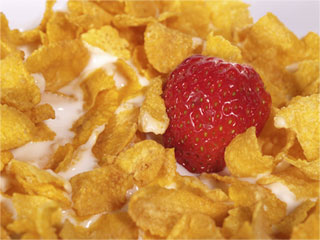Most “natural” cereals likely to contain GMOs
By Ken Roseboro
Published: March 1, 2011
Category: GMO Contamination

To access all the articles in this month's issue of The Organic & Non-GMO Report, SUBSCRIBE NOW.
Does “natural” mean non-GMO? Not likely. Many breakfast cereals labeled natural are likely to contain ingredients from genetically modified corn, soy, canola, and sugar beets.
This was a key finding from a survey of natural cereal manufacturers conducted by The Organic & Non-GMO Report. Several natural cereal manufacturers admitted that their products may contain GM ingredients, one manufacturer refused to comment, and three are putting their products through a non-GMO verification program to avoid the use of GMOs.
While GM ingredients are prohibited in certified organic food products such as cereals, “natural” products have no such requirements.
“Many natural products use GM ingredients”
Four natural cereal manufacturers issued statements saying that their products may contain GMOs. Malt-O-Meal, which manufactures Mom’s Best Cereals, said “many all-natural products use some genetically modified ingredients, particularly corn. We respect that some people object to GMO ingredients for a variety of reasons, and we’re continually researching and testing alternative ingredients that will make our cereals appealing to more people.”
Quaker Oats, which manufactures Mother’s Natural Cereals, said that because it buys bulk grains such as corn, soy, and canola “there is always a possibility that those grains may contain GMO material due to cross contact during manufacturing and transportation.”
Bear River Valley Natural Cereals issued a statement saying “We believe genetically engineered corn and soybeans are likely present in all of our finished products containing these grains.”
Kashi, which is owned by Kellogg’s, said that some of its foods “may contain GMOs.” Kashi also said that “many factors outside our control, such as pollen drift from nearby crops and current practices in agricultural storage, handling, and shipping, have led to an environment in North America where GMOs are not sufficiently controlled.”
With GM corn and soy acreage at record levels in the United States, it is challenging to find supplies of the two crops—especially corn—that don’t contain at least trace amounts of GMOs.
No comment from Bear Naked, no response from Hain
Another cereal manufacturer, Bear Naked, which makes granola from “100% pure and natural ingredients” didn’t want to say anything. They issued a statement through their public relations firm, saying: “Unfortunately Bear Naked is not able to comment on this topic at this time.”
Calls and emails to the Hain Celestial Group about the use of GM ingredients in their Health Valley and Arrowhead Mills natural cereals were not returned.
Non-GMO verification
Three natural cereal manufacturers, Annie’s Homegrown, Barbara’s Bakery, and Peace Cereals are having their products verified through the Non-GMO Project.
Aimee Sands, Annie’s Homegrown marketing director, said “Annie’s is strongly opposed to the use of GMOs, and we make every effort to ensure our suppliers furnish us with complete information so that we can adhere to this position. We are also working to further test and verify the non-GMO status of our offerings.”
Kent Spalding, vice president of marketing at Barbara’s Bakery, says his company is working with the Non-GMO Project to minimize GMO risks. “They are working with our research and development team to go through the (non-GMO) protocols.”
Spalding also admitted to challenges finding reliable sources of non-GMO corn. “That’s the one we are having the biggest challenge with,” he says.
Spalding says Barbara’s recognizes the importance of being non-GMO. “It’s a defining issue for natural foods and certainly important to us.”
Peace Cereals joined the Non-GMO Project because the company already had a non-GMO commitment and because non-GMO is a growing trend, says Rob Goluba, director of marketing at Hearthside Foods, which recently purchased Peace Cereals.
“It makes sense to have our products non-GMO verified,” Goluba says. “There are too many unknowns and negative effects with GMOs.”
Thirteen Peace Cereal products are going through the Non-GMO Project’s verification program. Once the verification is complete, Peace Cereals will feature the Non-GMO Project seal.
Time to regulate “natural” label?
The likely use of GMOs in natural cereals is sure to fuel the growing debate over the validity of “natural” labels on food products. Does natural mean that GMOs are acceptable?
There have been calls for the US Food and Drug Administration to regulate the “natural” claims on food products. Market research firm Mintel predicts that the “natural” claim will come under FDA scrutiny this year.
In 2010, the Hain Celestial Group called on all consumer packaged goods companies to adopt standards for natural and healthful products using a similar model to the National Organic Program standard. Hain published a guide to understanding “The ‘ABCs’ of Natural” and issued a statement, saying “it is time for companies to restrict the use of natural claims and accompany them with meaningful nutritional information that is consistent.”
© Copyright March 2011, The Organic & Non-GMO Report




